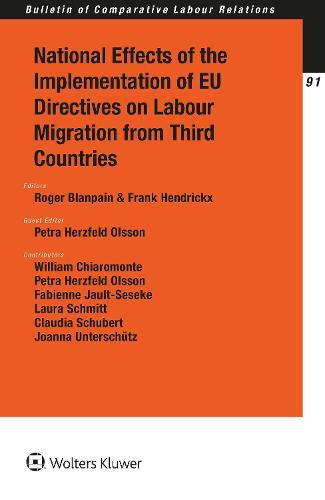Readings Newsletter
Become a Readings Member to make your shopping experience even easier.
Sign in or sign up for free!
You’re not far away from qualifying for FREE standard shipping within Australia
You’ve qualified for FREE standard shipping within Australia
The cart is loading…






Guaranteeing third country national workers robust equal treatment with regard to working conditions and pay is a crucial condition for avoiding social dumping, exploitation, and other reasons for regime shopping within the EU. However, Member States are still reluctant to compromise control of their borders and their labour markets. The EU legislation adopted is, as a result, fragmented and full of solutions that give Member States an extensive margin of room for manoeuvre. In this book six distinguished European labour law academics discuss how three EU directives on labour migration - the Single Permit Directive, the Blue Card Directive, and the Directive on Seasonal Employment - interact with the labour migration systems of France, Germany, Italy, Poland, and Sweden - five countries with very different characteristics and approaches to implementation.
Concrete issues dealt with in each country include the following:
conditions for granting work permits;
reasons for withdrawing a work permit;
how long a migrant worker can stay;
whether a migrant worker can bring his or her family;
employment and labour rights of migrant workers;
migrant workers’ access to social rights;
how a migrant worker may enforce rights;
sanctions for violations of applicable provisions; and
potential for permanent status for a migrant worker.
For each of these issues the authors analyse to what extent national legislators have been ready to adapt their national systems in order to fulfill the aims of the EU directives. They also identify unintended, or at least not explicit, effects of the implementation process.
The authors clearly reveal whether the ambitions of the EU when initiating this process can be detected in the implementation process, and how implementation of the three directives have changed and could change national law on these issues. As the first in-depth analysis of how the intersection of migration and labour law and their impact on labour and employment relations play out in the EU context this book brings important insights to the growing literature in this field. The analysis will be of particular interest to national legislators, but is also sure to be warmly welcomed by academics and practitioners in fields related to labour and employment and migration.
$9.00 standard shipping within Australia
FREE standard shipping within Australia for orders over $100.00
Express & International shipping calculated at checkout
Guaranteeing third country national workers robust equal treatment with regard to working conditions and pay is a crucial condition for avoiding social dumping, exploitation, and other reasons for regime shopping within the EU. However, Member States are still reluctant to compromise control of their borders and their labour markets. The EU legislation adopted is, as a result, fragmented and full of solutions that give Member States an extensive margin of room for manoeuvre. In this book six distinguished European labour law academics discuss how three EU directives on labour migration - the Single Permit Directive, the Blue Card Directive, and the Directive on Seasonal Employment - interact with the labour migration systems of France, Germany, Italy, Poland, and Sweden - five countries with very different characteristics and approaches to implementation.
Concrete issues dealt with in each country include the following:
conditions for granting work permits;
reasons for withdrawing a work permit;
how long a migrant worker can stay;
whether a migrant worker can bring his or her family;
employment and labour rights of migrant workers;
migrant workers’ access to social rights;
how a migrant worker may enforce rights;
sanctions for violations of applicable provisions; and
potential for permanent status for a migrant worker.
For each of these issues the authors analyse to what extent national legislators have been ready to adapt their national systems in order to fulfill the aims of the EU directives. They also identify unintended, or at least not explicit, effects of the implementation process.
The authors clearly reveal whether the ambitions of the EU when initiating this process can be detected in the implementation process, and how implementation of the three directives have changed and could change national law on these issues. As the first in-depth analysis of how the intersection of migration and labour law and their impact on labour and employment relations play out in the EU context this book brings important insights to the growing literature in this field. The analysis will be of particular interest to national legislators, but is also sure to be warmly welcomed by academics and practitioners in fields related to labour and employment and migration.